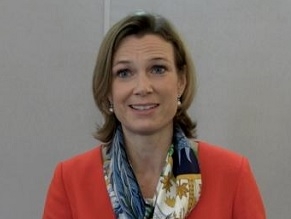|
World Jewish News

Katharina von Schnurbein, the European Union Coordinator on Combating Anti-Semitism.
|
'Throwing Molotov cocktails into a synagogue is always anti-Semitism'
30.01.2017, Anti-Semitism Throwing Molotov cocktails into a synagogue is always anti-Semitism, said Katharina von Schnurbein, the European Union Coordinator on Combating Anti-Semitism.
She was speaking earlier this week at a Jewish Leaders Conference organized in Brussels by the European Jewish Association (EJA) on the topics of security of Jewish communities and anti-Semitism in Europe.
In her address, Von Schnurbein slammed a German court ruling that an arson attack on a synagogue in Wuppertal was an expression of anti-Israel protest and not anti-Semitism.
In its ruling, the Dusseldorf High Court found no procedural errors in the 2015 and 2016 trials against three men of Palestinian descent for felony arson against the synagogue.
Von Schnurbein, who spoke at the Brussels conference on a panel exploring “The new anti-Semitism,” said : ‘’In my opinion, throwing Molotov cocktails into a synagogue is always anti-Semitism.’’
The arson attack on the Bergisch Synagogue in Wuppertal took place in the early morning hours of July 29, 2014, following an end of Ramadan celebration and during the height of anti-Israel protests in Germany and elsewhere over the Gaza war.
The men were found guilty of arson and given suspended sentences in 2015 with a threat of jail if they got into trouble again. Their threatened jail terms were lengthened in January 2016 following an appeal by the state prosecutor.
Holly Huffnagle, Policy Advisor to Monitor and Combat Anti-Semitism at the US State Department Office of Religion and Global Affairs, who also addressed the EJA conference, agreed with von Schnurbain. “We believe that when a Jewish house of worship is firebombed in response to Israeli policy, it is anti-Semitism,” she said.
She added that while criticism of Israel is not inherently anti-Semitic,” in the Dusseldorf case case, “a line had been crossed between legitimate criticism of Israeli policy and anti-Semitism.”
‘’Today, anti-Semitism extends across dozens of countries on different continents and takes many different forms," Huffnagle said. "We find anti-Semitism on the far left, the far right, and even in countries where there are no Jews.
"Most religiously-motivated hate crimes take place against Jews in the US. Last November, the FBI released its hate crimes statistics report for 2015. 53.3% of religiously motivated hate crimes, so over 660 incidents, were directed at Jews who make up less than 2% of the American population.
"Since 2014, the Report noted that crimes against Jews have increased by 9%. We've had multiple bomb threats to Jewish community centers and synagogues in the past two weeks, that have spanned 15 US states.The State Department's mandate is to monitor and combat anti-Semitism abroad. But we are aware that most anti-Semitic attacks in the US, as in Europe, reportedly still come from far-right, white nationalist, and neo-Nazi groups,’’ she added.
She continued : "There is a very real concern today of a current rise in far-right historically anti-Semitic parties in Europe... they now proclaim that they are pro-Israel, and therefore they are no longer anti-Semitic, or they can't be anti-Semitic.’’
"We fear that these extreme right-wing parties are actually using their anti-Muslim platforms to gain Jewish support. So how will Jewish communities respond when these extreme right-wing parties reach out, extend friendship, and make political promises to them,?,’’ she asked.
"For a number of Jewish communities in Europe, this is a pressing question... We have to remember that all forms of ethnic and religious prejudices are direct threats to European values of tolerance and respect, and also to the very foundation of liberal democracies.’’
She said ‘’our number one priority has been to protect Jewish communities and Jewish lives, and on numerous occasions over the past several years, behind-the-scenes efforts by our embassies have helped enhance security for Jewish communities in very concrete ways.’’
"Is anti-Israel the new anti-Semitism? Anti-Israel can morph into anti-Semitism when it questions Israel's right to exist and targets Jewish communities outside of Israel.Yet we are clear that criticism of Israel is not inherently anti-Semitic. Israel is a modern democratic nation-state and its policies can be criticized, like other states. And while understanding that sometimes criticism of Israel can indeed be anti-Semitism, we cannot lose focus on the other forms and sources of anti-Semitism today,’’ Huffnagle stressed.
EJA Director General Rabbi Menachem Margolin declared that the rise of the extreme right and populist parties presents both a short- and long-term challenge to Jewish communities.
“There is no question that we see so many of these anti-Semitic attacks coming not just from radical Islam but from typical European nationalism,” he said.
‘New problems are arising. Anti-Semitism is appearing more and more. In the long term it’s even more worrying because we see they are gaining power in all of Europe and we are very concerned about what is going to be 15 years from now: Will they be a majority? Will they control power in many European countries? And will we, God forbid, experience again the rise of an anti-Semitic government in Europe?”
During a session titled “Enhancing security of the Jewish communities in Europe 2017,” Philippe Markiewicz, Chairman of the Consistoire of Belgium, which represents religious institutions in the country, said he feared that the Continent’s old demons were starting to raise their heads again.
“After a long history of bad times, today, for the last 72 years, we are living in peace,” he said. “But new problems are arising. Anti-Semitism is appearing more and more.”
Markiewicz said that European democracy alone was not enough to stem the rise of the extreme right as he recalled that “Hitler was elected democratically.”
EJP
|
|
